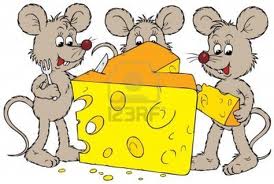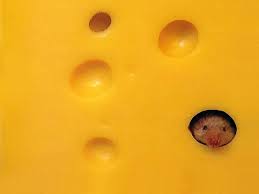- Joined
- Jan 23, 2022
- Messages
- 2,035
- Points
- 83
'Who moved my cheese?'- original by Dr. John Spencer. Singapore version:-'Where lays my cheese?'
100 mice were placed into a wooden maze the size of a football field. A pot of cheese was placed near to the mice where they could sniff out & easily find their way to it, daily to be fed, then return back to their comfortable homespace where there is water & shelter once the cheese was eaten up.
After 2 weeks, the pot of cheese was placed at another location further away. Most of the mice still returned to the same spot, thinking the cheese will be there. They waited for hours & days, got hungrier & hungrier, yet there was no cheese supplied.
So they discussed among themselves on their predicament. They then split themselves into 3 groups based upon the consensus reached. Most of them decided to sniff for the cheese that might be somewhere else in the maze. But one group decided to remain, to return back to the same spot, chided others for being stupid to find cheese elsewhere when for days, the cheese had remained in the same spot. Eventually, they starved to death.
Another group chose to find the cheese elsewhere, but decided to do it on their own as they do not trust anyone & figured that they are smarter mouse than the rest, & will eventually find the cheese & eat to one's fill individually alone.
Yet one group decided to ORGANIZE themselves, UNITED in 1 common goal, to find the cheese more efficiently & effectively for all, as the maze was huge & will take time to find it. They pooled their remaining cheese, those with more sharing with those with less so that none would starve, & a bit more for the scout mice sent out to sniff for cheese as they had to work harder than the rest.
For hours, the scout mice hardworkingly moved along the corridors, leaving bite marks on the walls of maze so that they can keep track of the journeys & return. Some of them encountered the 2nd group of mice that wanted to individually find the cheese. They were fat & claimed to have found the cheese, & will tell them where if the scout mice gave them their remaining cheese. Some of the scout mice believed & gave them their cheese, but were given misleading directions & soon lost their way, & starved to death realizing they had been fooled.
The other scout mice yet encountered another of the 2nd group of mice. This time, the 2nd group convinced the scout mice to join their group, as they claimed to know where the cheese is. Some of the scout mice believed & joined up, but in reality, were only made used of to find the cheese for those incompetent 2nd group whom had no clue as to where the cheese was.
Yet other scout mice were told by their group to never trust the words of anyone. Only when they find the cheese, then it is real. For hours, they plod on, making tracks & finally found the cheese. They then led the rest waiting at home to the cheese location, & had their fill. But being smarter than the rest of the other mice, they started to ration out their food as they believed that it may be moved again, & if they can find this spot for cheese, there may be other spots too. So the scout mice in the group continue to wander around the maze hardworkingly daily to ensure their group will never starve again or leave anyone behind.
So which metaphorical group do you belong to, or want to belong to?
100 mice were placed into a wooden maze the size of a football field. A pot of cheese was placed near to the mice where they could sniff out & easily find their way to it, daily to be fed, then return back to their comfortable homespace where there is water & shelter once the cheese was eaten up.
After 2 weeks, the pot of cheese was placed at another location further away. Most of the mice still returned to the same spot, thinking the cheese will be there. They waited for hours & days, got hungrier & hungrier, yet there was no cheese supplied.
So they discussed among themselves on their predicament. They then split themselves into 3 groups based upon the consensus reached. Most of them decided to sniff for the cheese that might be somewhere else in the maze. But one group decided to remain, to return back to the same spot, chided others for being stupid to find cheese elsewhere when for days, the cheese had remained in the same spot. Eventually, they starved to death.
Another group chose to find the cheese elsewhere, but decided to do it on their own as they do not trust anyone & figured that they are smarter mouse than the rest, & will eventually find the cheese & eat to one's fill individually alone.
Yet one group decided to ORGANIZE themselves, UNITED in 1 common goal, to find the cheese more efficiently & effectively for all, as the maze was huge & will take time to find it. They pooled their remaining cheese, those with more sharing with those with less so that none would starve, & a bit more for the scout mice sent out to sniff for cheese as they had to work harder than the rest.
For hours, the scout mice hardworkingly moved along the corridors, leaving bite marks on the walls of maze so that they can keep track of the journeys & return. Some of them encountered the 2nd group of mice that wanted to individually find the cheese. They were fat & claimed to have found the cheese, & will tell them where if the scout mice gave them their remaining cheese. Some of the scout mice believed & gave them their cheese, but were given misleading directions & soon lost their way, & starved to death realizing they had been fooled.
The other scout mice yet encountered another of the 2nd group of mice. This time, the 2nd group convinced the scout mice to join their group, as they claimed to know where the cheese is. Some of the scout mice believed & joined up, but in reality, were only made used of to find the cheese for those incompetent 2nd group whom had no clue as to where the cheese was.
Yet other scout mice were told by their group to never trust the words of anyone. Only when they find the cheese, then it is real. For hours, they plod on, making tracks & finally found the cheese. They then led the rest waiting at home to the cheese location, & had their fill. But being smarter than the rest of the other mice, they started to ration out their food as they believed that it may be moved again, & if they can find this spot for cheese, there may be other spots too. So the scout mice in the group continue to wander around the maze hardworkingly daily to ensure their group will never starve again or leave anyone behind.
So which metaphorical group do you belong to, or want to belong to?








 .
.